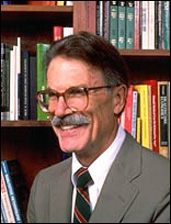John Farquhar
Year: April 26th, 2001
Location: Stanford, California
Interviewed by: Blackburn, Henry
Abstract
This is largely the personal story of a pioneer lipid researcher who was involved in the chemistry and mechanisms at the leading edge of the field. Farquhar then evolved to become a pioneer in population strategies of health promotion after returning to California following years working with Ahrens at the Rockefeller. It describes this transition, including an influential Sabbatical at the London School of Hygiene and Tropical Medicine with Donald Reid and Geoffrey Rose and as a fellow in the first ten-day seminar on CVD epidemiology at Makarska in 1968.
Farquhar highlights issues behind the professional rejection of prevention and public health approaches and discusses the curse of scientific elitism. There are anecdotes about Pete Ahrens in this regard, and about John Gofman’s prescience in the role of lipoproteins in atherosclerosis. There is material on the origins of community studies or public health trials and demonstrations of health promotion, in which Farquhar is a conceptual pioneer and international leader. And there is lots of commiseration between two community health types about the current culture of the individual, high-tech medicine and the industrial complex, and the medicalization of prevention. (Henry Blackburn)
Quotes
Naysayers
I remember one time at the Rockefeller, when Pete [Ahrens] was eating cream cheese with bagels, and I said, ‘What’s that?’ And he said something then that impressed me, it had to do with ‘we don’t really know enough (to take action)’ or something along those lines. But when you saw his personal behavior, you wonder to what extent was this simply a New Yorker who didn’t want to give up his ‘New York’ stuff. Pete, as you know, in his later years, became so angry that the whole field—the influence of diet and cholesterol hadn’t been really worked out—that he decided to be against it all. It was just really very strange.
Priority
The [three Community] grant went in in ’71 or in late ’70. This is relevant because some people think that North Karelia was first. Actually we were first. Let’s just say we were equivalent, but we actually had a pilot project published before we started the Three Community Study which was in ’72.
Elitism
Scientific elitism, reductionism, being fearful of other people’s thinking you aren’t as good a scientist as they, leads people to bend over backwards to pick the language that will make them appear to be as critical as they were taught to be. So it means the likelihood that something that was observed of relevance is obscured by exculpatory language that demeans and diminishes the potential importance of the [whole] observation. [ed. John Farquhar is referring to the Commit Trial; Henry Blackburn adds MRFIT and MHHP conclusions as similarly influenced.]
[ed. There’s a story about how you played one off against the other, Reid and Rose, when you would interview each with the same ideas, says Henry Blackburn] That’s right. I remember Reid being concerned – he was hooked on the fact that I was Scottish and he was Scottish and I used to play on that one. Geoffrey, not very voluble, was a man of few words. In any case, the interchange was something along the lines, what did Reid think about [what I should do] when I returned. Is it better to do a community study or other clinical trials? The discussion with Geoffrey was quizzing him – what were they planning to do in the British Factory Study? But I certainly know that I thought then, before I returned, that people live in communities and not in factories or in doctor’s offices. “People don’t live in doctor’s offices” is the line I used to use when we were getting the Three Community Study together. Really, people at that time thought a total approach [to prevention] was you could see a doctor a couple of times and that takes care of it. Now I don’t know where I got the idea that that was insufficient. Maybe Geoffrey saying they were going to try and do something .
Preventive Trials versus Community Trials
Well, I’ll tell you what I was thinking and I’m not sure when I caught on that I was very much opposed to MRFIT. What I do remember is that MRFIT said to me: more doctor’s offices, clinics…
HB: It was a clinic approach. But it was a trial to replace the Diet-Heart Study. NIH had to do something and this seemed the most efficient way to demonstrate potential prevention.Peer Review:
Well later we had all kinds of trouble with reviewers on the first version of the Five City Project. It was a rainy day and they came out and the head site visitor was smoking cigarettes and he was a psychiatrist and there were three other smokers. I came into that room and said, “Oh my God.”
Dissimination
. . .what we need to do is get a training grant to train people in the political aspects of health and advocacy and social marketing. That’s what is needed. We need a crop of people who are trained in liberal arts and trained in science and trained in public health and medicine who will then get out there and do battle with the ‘forces of evil’ if I may use that word. And really take it on as an obligation. The fact that scientists continue to think that all you need is the truth and it automatically will spread. There’s lack of attention to dissemination…
Full Transcript Access
Full transcripts of interviews may be made available to those engaged with original materials for scholarly studies by contacting us.
